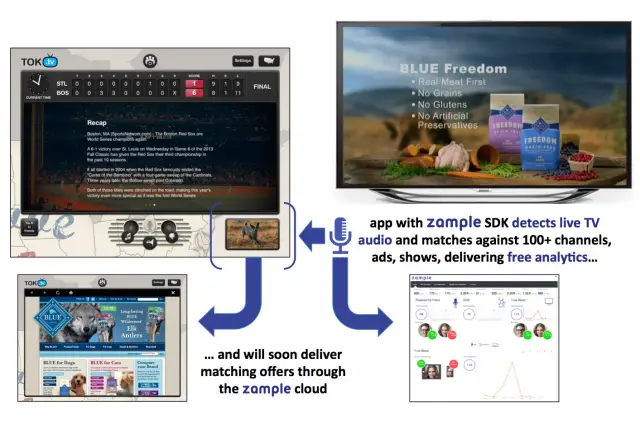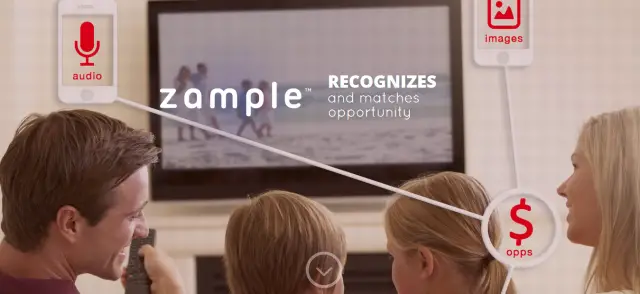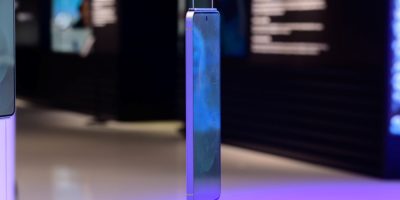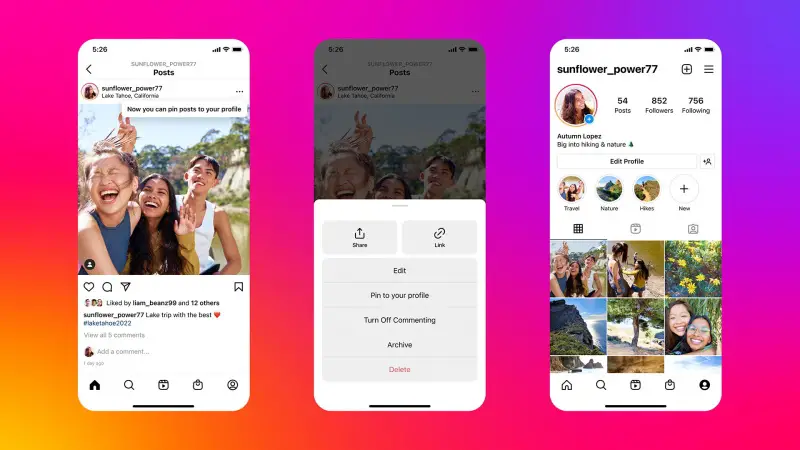We’re sure you’ve used apps like Shazam and SoundHound to identify unknown music that might be playing in a club or on the radio. What if we told you that a hot new advertising startup was looking to use those same concepts to shake up the world of mobile marketing and app development? Sunnyvale-based Zample wants to do just that with a unique new platform that will help developers and users alike.
To put it simply, an app that uses Zample would literally listen to what’s going on around — be it a movie or TV show you’re watching — to help identify your interests. The technology itself isn’t user-facing, but rather a tool for developers who could use the more useful analytics it provides to help serve up better ads and in-app experiences.
Need a visual? Imagine a developer uses Zample and the analytics show 80% of their userbase happens to watch Oprah. The developer could use that information to serve up ads that encourage people to subscribe to Oprah’s book club on Amazon or to download the official Oprah app.
Beyond advertising, Zample could also soon enable rich “second screen” experiences, giving users a breadth of information on their tablet and smartphone about whatever they’re watching. The second screen concept is not unlike what Yahoo was doing with IntoNow before they decided to shut it down.
As exciting as all that sounds, though, it’s worth noting that Zample is only looking to launch the analytics component of their SDK at thi tmie. So what’s Zample’s secret recipe for something like this? Let’s break it down for you.
How Zample works
Zample is a cloud-powered platform that has information on many different consumer products, brands, television shows and movies. The SDK allows developers’ apps to periodically “listen to” the user’s surroundings, and will use what it hears to deliver more information about their users’ interests. It does this by using a system similar to Shazam’s, which can identify songs, shows and movies based on audio alone, and gives the user more information about whatever they’re listening to or watching.
“The intended benefit for developers is to not have to think about what contextual offers or other relevant content will show up and what to do with it, just let Zample manage that,” said a Zample spokesperson.
For instance, the app might recognize that the user is currently watching an episode of Dexter, and will let the developer know that someone in their userbase enjoys Dexter. The developer can then use whatever data they gathered to deliver ads and other meaningful content, or they can let Zample do that heavy lifting for them.

Going back to the Dexter example, if a developer notices that a large amount of their users enjoy watching Dexter they could deliver ads that will urge you to buy a set of DVDs from Showtime, or check out more clips online. They could also show you more information about the episode you’re watching, characters from the show and other tidbits that may interest you.
Zample is hooked up with live broadcasting information from over 100 different networks, spanning hundreds of thousands of hours of movies, TV shows and even all the ads shown in between. This wide range of sources ensures developers will have no shortage of relevant content, ads and information to deliver to the end user.
Quelling common concerns
One of our first questions upon hearing about Zample was how the company would look to protect user privacy. After all, it isn’t wholly comforting to know that an app could randomly enable your microphone at any given point for the sake of analytics and monetization. We have concerns in a couple of different areas:
- Privacy concerns regarding data collection
- Battery life issues from constant use of the microphone
Thankfully, Zample had no problem addressing either one. In the realm of privacy, we’re told that information is never personally identifiable, so you can probably rest easy knowing your information isn’t being sold off to marketing sharks.
And then there’s the issue of battery life, though Zample says we should have nothing to worry about. Their SDK doesn’t draw on battery any more than any other analytics or advertising solution.
The microphone in the device is only “listening” for a short amount of time whenever Zample does its periodic check, so any impact on battery life is negligible and incidental. While we don’t have a clear picture of Zample’s SDK or a full set of policies just yet, Zample assures us that their offering shouldn’t scare potential privacy zealots away.
The future of Zample
We’re quickly reminded that this is only the beginning for Zample. Alongside listening for movies, TV shows and advertisements, Zample is also exploring a couple of other options for expanding their SDK. Namely, they’ll want to add music to their repertoire, and might also experiment with bringing live radio broadcasts into the mix.
Zample also has plans to introduce an image component to their SDK, allowing developers to gather information on their users’ interests based on the images they come across within their app.
The rollout will be quite ambitious for this new startup, but they’ll be tackling it with a three-pronged launch rollout that’ll allow them to get their ducks in a row and ultimately deliver the best product possible:
- Analytics. The first stage is to equip developers with the base analytics gathering tool that will allow them to see what their userbase is interested in. Developers can do whatever they see fit with this information, including using it to effectively target advertising with an alternate advertising platform.
- Advertising. Secondly, they’ll be integrating their ad delivery component which can automatically serve up appropriate and relevant ads without much work on the developer’s part.
- Second Screen. Finally, they will look to give developers the tools they need to create unique features such as an app that delivers information about whatever they’re watching.
This will all be fueled by the $2 million private injection Zample got to help with this ambitious launch, but it won’t take money alone for this to work. They’ll need actual developers getting their hands dirty and helping them perfect the platform to make sure it’s polished as well as can be ahead of the full-scale rollout.
One such developer is Tok.TV, whose baseball app enables friends to talk and chat with each other while the ball game is going on. It sounds like the perfect marriage for an app like this, as Tok Baseball could recognize which exact baseball game each friend is currently watching and automatically setup a chat between them (while also delivering real-time and relevant stats, player information and more like it already does).
The potential for Zample is huge, and we can’t wait to see the unique offerings that’ll eventually spawn as a result of its existence. Interested in finding out more? They’re currently accepting inquiries over at their website, so get over there and take a look if this is something you think would be perfect for your own app.












I can’t help but to feel like this might be stepping over the line. I for one, still value my privacy.
Sounds annoying
Listening to my surroundings? I don’t know if I’m willing to share that, no matter how anonymous. I’ll have to read through the privacy terms.
I really don’t like the idea of my phone spying on me. I hope that it is clearly indicated which apps use it so I don’t download them.
I guess we’ll have to start looking for certain permissions in the Play Store: ‘record audio’, which many apps already do.
I like it as a second screen but I would prefer Google Now being able to do this when I’m watching a show, just like Shazaam does for certain events or ads on TV.
Google now, can identify your tv shows (if you have a smart tv it even suggests you try using it’s listening feature) right now it just tells you the standard show info, and only works on live tv, but it seems like this functionality could easily expand.
Not using more battery life is total BS. Its going to have to record with microphone, then make it into a file using ram, and upload it using wifi/4g. Oh and remember how you were discussing your business plan with your new clients? they heard that and think its a great idea and will now be stealing it. Also o im in the middle of this skype chat on my phone, but im glitching out because my microphone is in use from another service. hey honey, how come your phone has all these ads for porn…
Google should ban this from the play store.
This is how it actually works. zample ingests live TV in the cloud and fingerprints that content for easy identification. from the background of apps with our SDK, they take a tiny sample and send that to our servers. if there is a match against a piece of media, we return a matching app, or some offers that are contextually relevant. It can’t “listen” to your conversations, the only people insane enough and actually motivated for that is the NSA, and they already know about your business plan. ;) zample is simply matching and then trying to deliver stuff you may actually be interested in, instead of the usual ad crap you are all used to getting. Don’t be so Pharanoid, we just want to make it easy for you to download the Daily Show app when you are watching the daily show, served as developers would usually serve in their apps, not any of these other zombiepolocolypse conspiracy theories. :)
HAHA “Pharanoid”, great new word for this site. While Zample may not listen to your conversations, once they have the permission to turn on background microphone, they CAN listen to whatever they want to. Your trusting their employees. There is no possible way to have it identify something as TV before you start recording. What’s really dangerous about this, is since it would be built into other apps, not a “zample app” there would be no way without super user permissions to disable it if you wanted to keep using apps that zampled. Also zample’s site says they monitor images along with audio, so apparently they are turning on our camera(s)? and in one demo picture they seem to be identifying gender based on camera images? super sketchy (puts on a guy fawkes mask everytime I look at phone).
To be honest the battery usage bothers me way more than the privacy.
Just what everyone has been begging for, can you make your apps use even more battery and be just a tad be more invasive? THANKS:)!
Also hyper targeted advertising is pointless, sure you might slightly increase clickthrough, but since I’ll be pigeonholed into such a tiny demographic, you miss out on me ever seeing ads outside my comfort zone. Regardless of the fact I might not be totally selfish, maybe I buy other things or tell friends and family about products they might like I saw advertised.
P.S.
Shawn-Do you work for Zample?
Hi Max, let’s try this again, and yes I do work for zample. No, we cannot “do whatever we want to” and technically there are no humans involved to “listen” in on your conversations, further, it is matching a tiny snippet of sounds against a database of known shows, movies, and ads, not trying to figure out what was said in a couple of seconds. Anything that is not a match must be purged, it is sooo expensive to run these queries that doing something that you suggest here is just simply phantastical, and I will say again, pharanoid. lol! ;) (I am in marketing btw). Also, I don’t really understand your dangerous statement, anymore than Shazam is dangerous doing the exact same thing to id a song. Silly. We actually built this so developers could better monetize their audiences by knowing more about the demo of the whole audience, and having that give them better leverage to value their app. This only makes sense when related to “media”. Matching a show or a ad is heavy backend work, but listening in and understanding everything you may be saying is just crazy. Also, zample, and others with similar tech do not leave the mic open and record all your conversations, it is not how it works and as I said, is totally unrealistic. At scale, this is happening millions of times. Trying to imagine a back room of evil elves listening to millions of periodic couple of second snippets and then unleashing the evil non-sensical no plan on the world! lol! Not.
Now, on to your image issues. zample offers an image SDK (soon) that rests in apps with publicly available image streams and feeds. The developer sends image ids our way, and we match against a DB that has determined if images have brands in them (e.g. coke, geico) and then can return a match offer. V for Vendetta is one of my top 10 favorite movies, I fail to see how the sky falls with this one!
Lastly, your opinion on targeting is fine, we all have them. I have been testing this stuff for quite some time and its awesome. I like watching some show and actually have an ad wall deliver something that doesn’t suck. Also, it doesn’t pigeon hole you, it is additive.
Further, I have been an entrepreneur my whole career, and I wanted to arm the developer that killed themselves to deliver a cool app that did a great job building an audience to get paid for their hard work, which is a sort of Nielsen-esque way we are trying to accomplish.
I won’t say that any of the pharanoid comments on this thread about this type of technology being misused is impossible, by some institution with unlimited resources to “spy” with no reasonable, and not answerable, to a business use case (I mean, what would it be??). Anything can be done with enough money, focus, and a determined team, but to pin NSA intentions and behavior on our company is silly. We would literally go broke trying to do what is suggested in mere hours, have hundreds of thousands of useless snippets that don’t make any sense to the human ear, and that is about it. To actually do what is feared, you literally would have to be the NSA with the intention of listening in on every conversation to find “something”. To a business, that is just insane. What “something” would it be?
It bears mentioning, lastly, that we are working with awesome developers everywhere and ad networks that have built up a great deal of trust with their users, and there is simply no business incentive to doing any of the fearful things being discussed here that would completely negate the purpose of building a business to begin with.
If we are right about our course and focus, developers will eventually earn more for their hard work, users will see things that may actually interest them around content they are consuming, and advertisers trying to reach that interested audience with those offers can actually reach them without nuking the rest of us to reach them. Ambitious goals to be sure, but hardly nefarious.
#1 Unless I am misunderstanding this there is a big difference between you and shazam type apps. Unlike shazam where I manually turn on microphone for a specific set of time and watch it turn off, this would run in the background of apps designed for entirely different purposes.
Am I wrong? is this not how it works?
#2 I understand no humans are intended to be involved. What safeguards do you offer that this is true? How long will a sound clip stay on your server? Will this time limit be guaranteed in a binding privacy policy?
#3 How long are the audio clips? How often are samples taken?
#4 While I understand spying seems like it would be massive amounts of work, there would be ways to search for keywords and phrases (such as business plan, idea, gossip, secret, etc just to name a few). Yes it might be a massive effort, but as google shows us, data is worth it’s weight in gold. Advertisers already know what tv we watch, but I bet they’d pay a pretty penny to know what I said after the show. Advertisers have an insatiable thirst for data. I’m not accusing Zample of doing any of these things of course, but choosing to be good is different from preventing evil to be a possibility. Most developers are great, but many unscrupulous developers also lurk amongst the play store. A bell cannot be unrung, so all privacy concerns need to be handled preemptively. There is no oops my bad.
#5 How does the service guarantee a users anonymity?
#6 The dangerous statement I made was that since apps would be using this as an api, it cannot be decoupled from apps. If a user didn’t trust Zample for some reason, they’d have to abandon using any apps that developers chose to embed it in. Shazam is different since it is a standalone app, that only records when a user requests it to record.
#7 The ability to work across multiple apps, delivers an enormous amount of data to zample, much like all the internet trackers from facebook and google and everyone else do. Do not track initiatives should gain strength in my opinion. Using the internet shouldn’t automatically give away all privacy rights.
#8 Does zample api run when apps are running minimized or as background tasks? or only when an app is the foreground?
#9 Hyper-Targeted advertising pigeon holes you in the sense that the ads served are only targeted based on certain known information, and only to that specific user. Widespread non targeted ads allow customers to learn about products they might not have known about that may be useful for their friends.
#10 I’m still confused about the image sdk, is it just looking for images in other apps(which would be ridiculous, so everytime facebook posts a coca-cola ad, you will then say this user must like coca-cola?) or does it use the device’s cameras?
#11 Nielson’s system, is incredibly non-user specific on purpose. This is very different. Nielson only collects data from users who opt in, and only in very scientific and statistical ways. They also even pay people to do it. If you feel like paying for my data, maybe we have a different story, any man can be bought for the right price :)start the bidding!
#12 Almost all mobile ads suck, most of us are pretty immune to glazing past them without giving a second look, this will not create or change ads for the better in anyway, only target them more.
#13 Finally can you explain to me how this could possibly not affect energy usage and battery life? Microphone usage and data upload use battery, as does feeding new updated ads back to the apps. Because if this reduces battery life by even 10 minutes, then it’s a cost users shouldn’t have to bare.
I look forward to you addressing these concerns.
TL:DR
Zample prove to us why we should trust you and not fear your presence in our apps.
Lol, wow, for a non-customer, non-user you sure are concerned. I can either spend my Sunday with my family or try to answer and convince you, which my prior words seemed to find no home. The short answer is, our company is on the up and up, trying to use this technology for something more interesting than finding a song, as a service to users and developers. Users like yourself can simply not allow the service if you are not comfortable in apps that use it. Users like myself, and many that have been using it in our testing, are enjoying the benefits rather than trying to determine reasons to not do it. I’m sure you can imagine why a startup would actually focus on its mission. :) Most of your questions are opinions, and technical questions are easily answered for you via Google, as ACR is very common and has been around in practice for years. I appreciate your thoughts though, it is always good to review our activities through the eyes of others to better understand their views, which was my intent in jumping in to address some Q’s.
My last comment, I really don’t think there is anything we can do to alleviate “your” fear, I point that out because of the many that do not share this level of concern. We live in a climate of nobody trusting business, the rich, etc. Someone is always out to get you, or so some believe. (some actually might, but it isn’t coming from our team of nerds) :)
Meant to add, Shazam does background processing to detect the same things while the app is not in the foreground, which as you pointed out is not something you would not prefer. This is not a feature we provide as part of our ad wall, so watch out (they may be out to get you). :) Here is the link if you are interested: http://www.electronista.com/articles/13/05/23/auto.tagging.recognizes.songs.tv.shows.as.a.background.process/